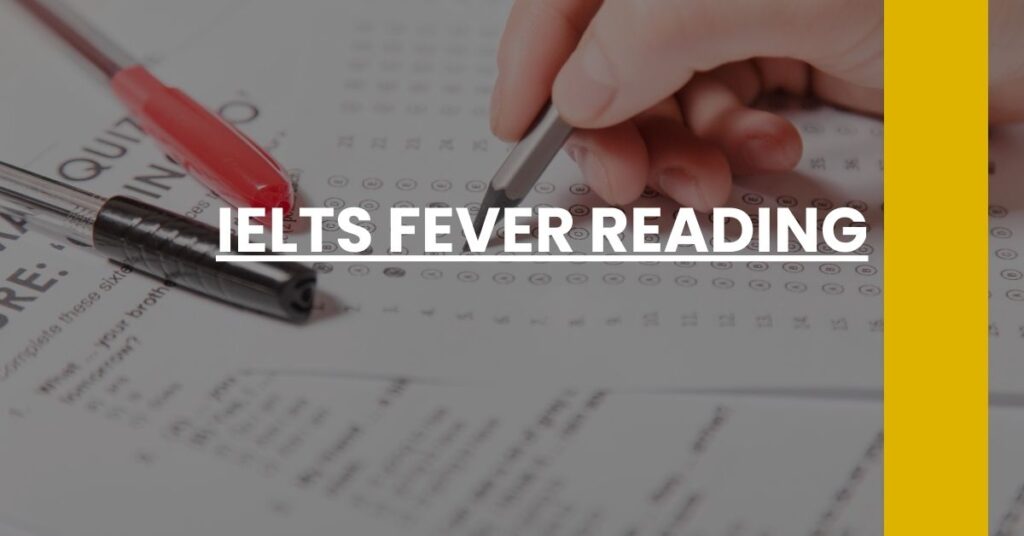Ielts fever reading strategies can unlock the doors to your test success.
- Skim and Scan Techniques: Master time management with efficient skimming and scanning methods.
- Vocabulary Expansion: Enhance comprehension and answer accuracy with a robust vocabulary.
- Practice with Mock Tests: Improve your IELTS fever reading score through consistent mock test practice.
Ease the IELTS fever reading challenge with targeted preparation.
- Understanding IELTS Fever Reading
- Exploring the IELTS Reading Format
- Effective Techniques for IELTS Reading Success
- Common Pitfalls and How to Avoid Them
- Practice Makes Perfect: Utilizing Mock Tests and Samples
- Expert Opinions and Tips
- The Role of Vocabulary in Scoring High
- Staying Updated: Tackling Current Topics in Readings
- Conclusion: Reflecting on the IELTS Reading Journey
Understanding IELTS Fever Reading
When it comes to the IELTS Reading section, you may be wondering what the term ‘IELTS Fever Reading’ refers to. It’s not a medical condition, but a metaphorical ‘fever’ that captures the urgency and intense focus that many test-takers experience while preparing for this pivotal exam component. Mastering the strategies essential to conquer the IELTS Reading section should be your ultimate goal to achieve that high band score.
What is IELTS Fever Reading?
You might have come across this phrase while searching for resources or advice on cracking the IELTS Reading section. “IELTS Fever Reading” essentially embodies the heightened state of concern and diligent study habits that many aspirants adopt as they aim to excel in their reading skills for the test.
Why it Matters
Being well-prepared for the IELTS Reading test is crucial. It not only reflects your ability to understand academic and general texts but also serves as a testament to your readiness to function in an English-speaking environment. Whether you’re applying for higher education, professional registration, or immigration, your reading score can significantly influence the outcome.
Exploring the IELTS Reading Format
The IELTS Reading section can initially appear daunting. However, with a logical breakdown, you can navigate its structure with ease.
Academic vs. General Training: Know the Difference
There’s a distinct line between the Academic and General Training versions of the IELTS Reading test. Below, we demarcate the features of both:
- Academic Reading: Aimed at prospective university students, this version involves three long academic texts which could be descriptive, analytical, or factual. You’re required to manage dense materials reminiscent of university textbooks and scholarly articles.
- General Training Reading: If you’re taking IELTS for migration or work purposes, this version’s for you. It includes extracts from books, magazines, newspapers, notices, or advertisements. The texts here are relatively straightforward, meant to assess how you’d navigate everyday English.
Understanding the contrasting demands of these two formats is pivotal to tailoring your preparation to the respective challenges they present.
Dissecting the Question Types
Within the 60 minutes allocated to this section, you’ll be posed with 40 questions spread across various types. From multiple-choice to sentence completion, and from matching headings to identifying the writer’s views, each question type targets a specific reading skill. Familiarize yourself with them to adjust your approach accordingly.
Effective Techniques for IELTS Reading Success
The key to acing the IELTS Reading section lies in the adoption of techniques that leverage your reading skills and time management.
Skill Enhancement Strategies
Incorporate the following strategic maneuvers to boost your performance:
- Skimming and Scanning: These two skills are pillars of efficient reading. Skimming helps grasp the main idea while scanning locates specific information. Use these techniques to navigate through texts quickly without compromising comprehension.
- Time Allocation: Allot a fixed time for each passage to ensure you don’t run over and miss answering later questions. Typically, 20 minutes per section should be your target.
- Keyword Identification: Focus on critical words in the questions that will guide you to the answers within the text. This practice can dramatically improve your accuracy.
Answering Tactics
When it comes to responding to questions:
- Look out for paraphrased sentences. The IELTS test makers are fond of rewording text content in the questions.
- Avoid the pitfall of spending too much time on one question. If an answer doesn’t jump out at you, move on and return to it if time permits.
- Trust your instincts. Your initial answer is often correct, especially if you’ve prepared rigorously.
Common Pitfalls and How to Avoid Them
While preparation is key, being aware of and avoiding common mistakes can greatly enhance your test performance.
Recognize and Rectify Errors
Here’s a brief rundown of typical pitfalls and how to steer clear:
- Overlooking Instructions: Ensure you read the directions thoroughly. Ignoring the details could lead to incorrect answers.
- Mismanagement of Time: As previously mentioned, time management is crucial. Don’t let complex passages eat up your time – keep moving.
- Carelessness With True/False/Not Given: These questions can be tricky. Pay attention to the nuances in the language to determine the right choice.
By understanding the ‘IELTS Fever Reading’ phenomenon, exploring the IELTS Reading format, applying effective techniques, and sidestepping common errors, you’re equipping yourself with the tools necessary to score high on your IELTS Reading test. With focused practice and the right mindset, you will be able to manage this ‘fever’ and perform to the best of your abilities.
Practice Makes Perfect: Utilizing Mock Tests and Samples
The Impact of Repetition
Imagine the IELTS fever reading section as a marathon. You wouldn’t run the 26.2 miles without prior training, right? Similarly, to acclimatize yourself to the test conditions, integrating mock tests and sample exercises into your study plan is essential. It’s not just about understanding the material; it’s about building the stamina and technique to perform well under exam conditions.
- Simulated Exam Environment: Regularly take full-length, timed reading tests to get used to the pressure of the ticking clock.
- Identifying Weaknesses: Use these practice sessions to pinpoint areas where you need improvement, be it in speed, comprehension, or specific question types.
- Gauge Progress: Periodically assessing your scores in these practice tests will offer tangible proof of your advancement.
Numerous studies, such as those by educational researchers Ebbinghaus and Karpicke, demonstrate the positive correlation between practice testing and improved performance. Thus, incorporating mock reading tests in your routine is not just advised; it’s backed by science.
Quality Over Quantity
While practicing a plethora of reading tests is beneficial, it’s the quality of practice that can tip the scales in your favor. Have a checklist for each practice session and review your answers meticulously. Understanding why an answer is correct or incorrect will sharpen your skills more than mindlessly churning through tests.
- Review Errors: After each test, spend time reviewing every mistake. Analyze the reason behind each one.
- Adjust Strategies: Adapt your approach based on the insights gained from your reviews.
- Seek Feedback: If possible, get a teacher or study partner to review your answers and provide a second opinion on your tactics.
Expert Opinions and Tips
Imagine having a roadmap to navigate the sometimes-overwhelming territory of the IELTS fever reading. Expert opinions and tips offer just that. They’re tailored directions to enhance your preparation journey, steering clear from common pitfalls and guiding your way to success.
Leveraging Expertise
While it’s easy to get drowned in the sea of tips available, focusing on tried and tested advice from IELTS educators can make a significant difference.
- Extensive Reading: Reading widely – from newspapers to scientific journals – familiarizes you with the variety of texts you might encounter.
- Context Comprehension: Experts agree that understanding the context of a paragraph can lead to quicker and more accurate answers.
- Predicting Content: Based on the headings and key paragraphs, predict what the passage might contain, to navigate it with greater ease.
Not taking tips from experts would be like ignoring a compass on a hike. They provide direction. The people behind these proven strategies have guided thousands of aspirants towards their desired scores.
Customizing Your Approach
Remember, there’s no one-size-fits-all strategy that works for every individual. Tailor the expert advice to fit your learning style and strengths. What one test-taker finds useful may not work for another, so customize your approach and adapt as you progress.
The Role of Vocabulary in Scoring High
Words as Tools for Success
In the realm of the IELTS Reading test, vocabulary is akin to a Swiss Army knife – versatile and invaluable. A rich vocabulary can help you dissect complex passages and grasp nuanced meanings. Consider these key points:
- Contextual Learning: Instead of rote memorization, learn new words in the context of sentences and passages.
- Synonyms and Antonyms: Recognize that the IELTS often paraphrases; it’s vital to know various forms of a word and its opposites.
- Usage Practice: Actively use new vocabulary in your writing and speaking to reinforce retention.
Enhancing your vocabulary is not just about learning new words, but understanding where and how to use them efficiently. Engaging with advanced texts and using techniques such as flashcards or apps can aid in building a robust lexical resource.
Staying Updated: Tackling Current Topics in Readings
The Pulse of the Times
Adapting to the timeliness of topics covered in the IELTS Reading section is like staying ahead in a tech race. The IELTS often incorporates contemporary subjects, translating to a need for being well-read on current issues.
- Diverse Reading Sources: Explore articles and reports on present-day occurrences and scientific advancements.
- Podcasts and Talks: Listen to discussions and interviews on hot topics, as they can also provide insights into current global conversations.
While specific research on updated reading topics for IELTS isn’t always available, maintaining a habit of exploring various sources is recommended. The benefits of being well-informed go beyond the exam—it broadens your perspective and enhances your understanding of English in its living context.
Conclusion: Reflecting on the IELTS Reading Journey
Embracing the journey towards mastering IELTS fever reading can be transformative. With each paragraph conquered and every question correctly answered, you inch closer to realizing your international aspirations, be it studying at a dream university or embarking on a new career abroad.
The Reading section is not merely a test of your ability to decipher words—it’s an adventure in critical thinking, time management, and linguistic agility. Each strategy you apply, all the vocabulary you learn, and the practice tests you take, weave together a tapestry of skills that enhance not just your IELTS score but also your proficiency in the English language.
As you continue to practice and adopt the expert strategies shared, remember that your efforts today are the seeds for your success tomorrow. So, immerse yourself in the wealth of resources available, stay curious, and keep the fever of learning alive as you prep for your IELTS Reading.
IELTS Fever Reading strategies unveiled: Boost comprehension and scores with proven techniques, expert advice, and practice tests.

